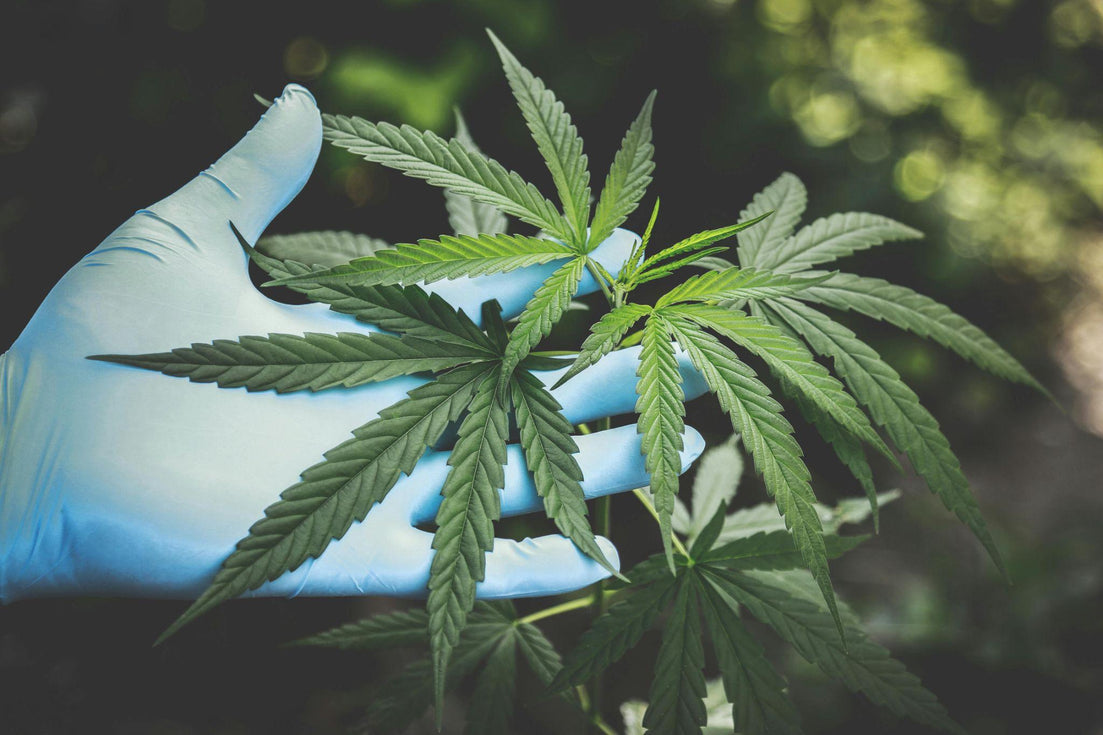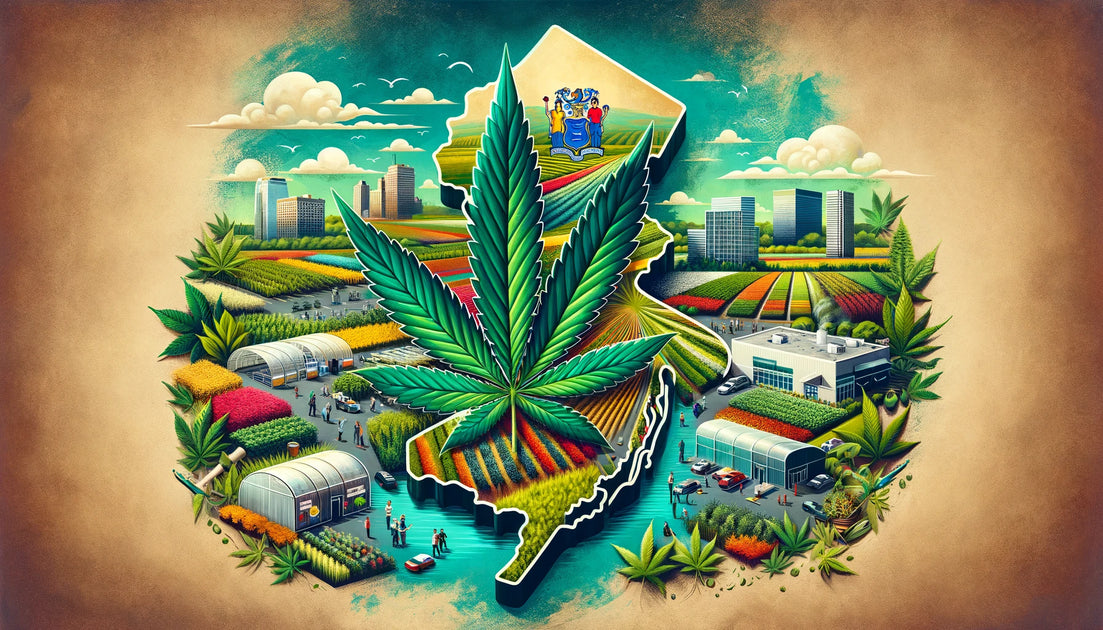Your cart is currently empty.

Ever found yourself in a maze of cannabinoids, feeling like Alice lost in Wonderland? You're not alone. Today's cannabinoid du jour is HHC vs THC. But what are they really?
A quick search online will flood you with technical jargon that might make your head spin more than the actual compounds themselves! Are these just new kids on the block or old players wearing different jerseys?
I promise by the end of this read, you'll navigate through this labyrinth with ease and confidence. Ready to take off? Buckle up as we journey into a world filled with molecules and mind-bending effects!
Understanding HHC and THC
Let's get a bit geeky for a moment, shall we? The world of cannabis is vast and ever-evolving. One thing that remains constant though, are the compounds found within it - cannabinoids. Now, you may be familiar with the term 'cannabinoids', but let's dig into this more.
What Are Cannabis Plant Cannabinoids?
Cannabinoids are organic substances existing in both hemp and marijuana vegetation. They play diverse roles from interacting with our bodies' cannabinoid receptors to influencing our mood or perception of pain. HHC and THC, two distinct yet related cannabinoids, are derived from the same mother plant.
The journey to understanding these cousins starts at their roots - literally. Both HHC and THC derive from the same mother plant making them part of one big happy cannabis family.
What Is Delta-9 THC?
If there was a celebrity among cannabinoids, it would probably be Delta-9 THC because of its psychoactive properties which can induce euphoria or sedation depending on dosage taken. Delta-9, as its friends call it casually over dinner conversations about molecular structures, is widely recognized across states even if not all laws agree with its charm.
Digging deeper into their chemistry reveals an interesting difference between HHC & THC despite their common origin - hydrogenation impact. This process results in alterations at the molecular level leading to differences in structure weight. Hydrogenated form
HHC vs THC: Similarities and Differences
Just like twins who share the same DNA but have different personalities, HHC and THC may come from the same plant but their effects can be quite distinct. This stems mainly from differences in chemical compounds as well as how they are processed within our bodies.
Which Is Stronger - HHC Or THC?
When it comes to us,
Step into the fascinating realm of cannabis and get acquainted with two major components - Hexahydrocannabinol (HHC) and Delta-9-tetrahydrocannabinol (THC). These compounds, both hailing from the same botanical family, play a significant role in shaping our feelings and perceptions. But they're not carbon copies; their distinct chemistry results from hydrogenation effects, giving them unique characteristics.
HHC vs THC: Similarities and Differences
When we talk about cannabinoids, the first name that comes to mind is often THC or Tetrahydrocannabinol. But have you heard of HHC? That's Hexahydrocannabinols. Both share similarities in chemical compounds and processes but are distinct in their own ways.
Similarities in Chemical Compounds and Processes
Cannabis plants produce various cannabinoids, the most famous being Delta-9 THC with its psychoactive effects and HHC which is a result of heating CBD isolate through hydrogenation. The most popular among them is Delta-9 THC, renowned for its psychoactive properties. On the other hand, HHC is an outcome of applying heat to CBD isolate via a process called hydrogenation.
The key here lies within these names themselves - 'tetra' refers to four while 'hexa' denotes six. These prefixes hint at the number of cyclic rings present in each compound's structure which has direct implications on their respective potency levels.
The Process Of Hydrogenation Impact On HHC & THC
In simpler terms, think about how butter turns into margarine through hydrogenation—it changes its form but not its core components. Similarly, when heat (or acid) gets applied to CBD isolates during hydrogenation—voila. We get our less famous cousin cannabinoid: Hexahydrocannabinols or HHCs.
This modification does more than just add two extra carbon rings though—it affects how both interact with your body’s endocannabinoid system too. However, it should be noted that both do engage CB1 receptors found mainly in our brain which leads us onto their potential health benefits...
Similarities Potential Health Benefits
Cannabinoids, including both HHC and THC, have been linked to a host of potential health benefits. They may help manage pain, inflammation, anxiety and even some symptoms related to chronic diseases.
Here's the kicker - while Delta-9 THC packs a powerful psychoactive punch, getting you 'high', HHC is said to offer similar effects.
When comparing HHC and THC, we see that both are cannabinoids with similar chemical structures. The difference lies in their creation process and effects on the body. While Delta-9 THC is naturally occurring and has potent psychoactive properties, HHC results from heating CBD isolate - offering similar benefits without as strong a 'high'.
Exploring HHC Products
The cannabis landscape is continuously transforming, with new items surfacing on a regular basis. One such rising star in the market is Hexahydrocannabinol (HHC), a novel cannabinoid that's catching consumers' attention.
HHC comes in various forms, but two popular ones are gummies and vape cartridges. These HHC products meet the legal requirement of containing less than 0.3% THC - meaning they're safe to use without getting you high.
How To Shop For HHC Products
Selecting top-notch HHC products can feel like navigating through a maze due to their sheer diversity on the shelves.
Your best bet when shopping for these goodies? Always opt for brands that provide third-party lab testing results. It might sound technical, but it simply means an independent entity has verified what's inside your product – crucially important considering health risks associated with unregulated markets.
Certificate of Analysis, often available online or by request from manufacturers, give you insights into cannabinoid content and confirm absence of harmful substances like heavy metals or pesticides. Transparency about these tests sets apart reputable brands from others out there looking to make quick bucks off uninformed customers.
A Closer Look at Popular HHS Forms: Gummies & Vape Carts
In this vast ocean of choices, let's zero down on two crowd favorites - HHS gummies and vape carts.
HHS Gummies: Sweet Treats That Pack A Punch
If you're a fan of sweets, then prepare to be delighted. HHS gummies have skyrocketed in popularity due to their ease of use and delectable flavors. It's like taking your daily vitamins but with an enjoyable twist.
But remember - these aren't your regular candies. Cannabinoids in these candies interact with our body's endocannabinoid system, potentially providing therapeutic effects - but take care to start small as the effect may not be felt for up to two hours. However, always start small – the effect might take up to two hours to kick in fully.
HHC Vape Carts: Your Pocket-Sized Chill Pill
Let's wrap things up.
The cannabis market is expanding, and Hexahydrocannabinol (HHC) is making waves. You'll find it in legal items like gummies and vape cartridges - they won't give you a high. When hunting for HHC, go with brands that show third-party lab tests to make sure of the quality. Keep in mind, HHS gummies are more than just sweet treats.
THC: The Well-Known Cannabinoid
Cannabis is a treasure trove of natural compounds known as cannabinoids. Of these, Delta-9-tetrahydrocannabinol (THC) takes the spotlight due to its psychoactive properties.
This fascinating compound does more than just give users a high; it has significant roles within our body's endocannabinoid system too.
The Chemistry Behind THC
So, what makes THC tick? Let's dive into some chemistry for a moment. Derived from the cannabis plant, this famous cannabinoid comes with an interesting molecular structure and weight that sets it apart in many ways from other similar compounds.
A crucial aspect about THC is its ability to bind with specific receptors found throughout our bodies—particularly in the brain—resulting in those characteristic euphoric effects we often associate with marijuana use. This connection plays out thanks to our endocannabinoid system—a network within us designed specifically for interacting with cannabinoids like THC.
Potency Levels: How High Does It Get?
We've all heard tales of people getting 'stoned' or experiencing intense highs after using certain strains of cannabis. That’s largely down to their delta-9 THC content—the higher it is, the stronger will be your experience.
In comparison though, another sibling on board named Delta-8 THC isn't quite so potent—it only hits half as hard but can still pack quite a punch if you aren’t careful.
Navigating Legal Waters
Laws surrounding cannabis are complex and constantly evolving globally - let alone when we zoom into specifics like individual cannabinoids such as HHC or delta 9 and delta 8 THCs. (#) The legal status of these cannabinoids is often a grey area and varies from place to place. However, one thing’s for sure: staying informed about the latest changes can help you navigate this complex landscape.
In many regions, THC content in products should be less than 0.3%—an important factor to keep in mind while shopping for your cannabis goodies.
The Many Faces Of THC
Were you aware of the fact that
THC, a crucial ingredient in cannabis, boasts an interesting chemistry that lets it mesh with our body's endocannabinoid system. This connection sparks the famed 'high'. Its strength swings depending on its type (Delta-9 or Delta-8) and how concentrated it is. But watch out. Laws about THC are always shifting and can be murky - keep yourself updated.
FAQs in Relation to Hhc vs Thc
Is HHC stronger than THC?
HHC isn't necessarily stronger. It's less potent, which means you might not feel as high as with THC.
Does HHC make you high?
Yes, but the effect is more mild and clear-headed compared to the intense euphoria often associated with THC.
Is HHC and THC different?
Absolutely. Although they're both cannabinoids from cannabis plants, their molecular structures differ significantly affecting their impacts on your body.
Why is HHC more expensive than THC?
The production process of HHC can be complex and costly due to hydrogenation needed in its synthesis.
Conclusion
Navigating the complex world of cannabinoids isn't as daunting anymore, right? We've decoded the chemistry behind HHC vs THC, their origins and effects.
Remember, while they're both from the cannabis plant family, HHC is a hydrogenated form of THC. This gives it different properties - key to remember when choosing between them!
Whether you're shopping for HHC products or opting for well-known THC options, always make sure to pick reputable brands. Your health matters most.
We may not have all answers yet due to ongoing research but one thing's certain: The world of cannabinoids keeps evolving. So stay informed and enjoy your journey through this intriguing molecular landscape!



